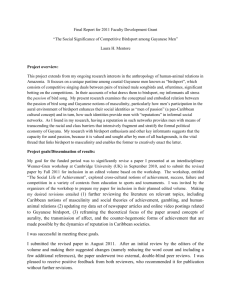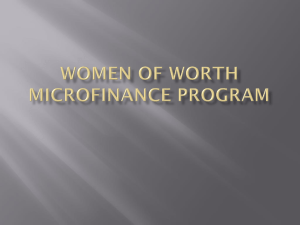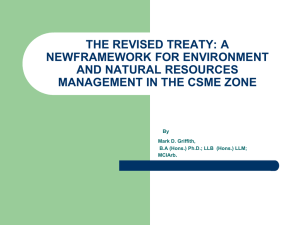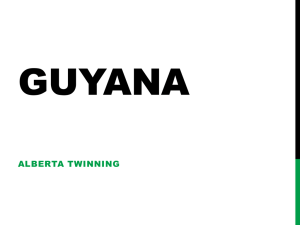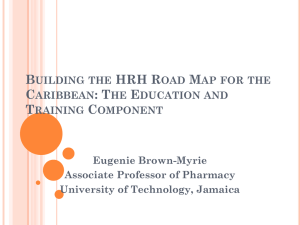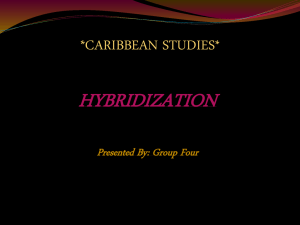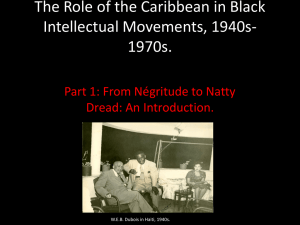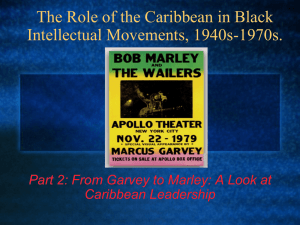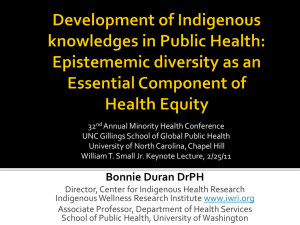Indo- Caribbean Thought and Feminism
advertisement
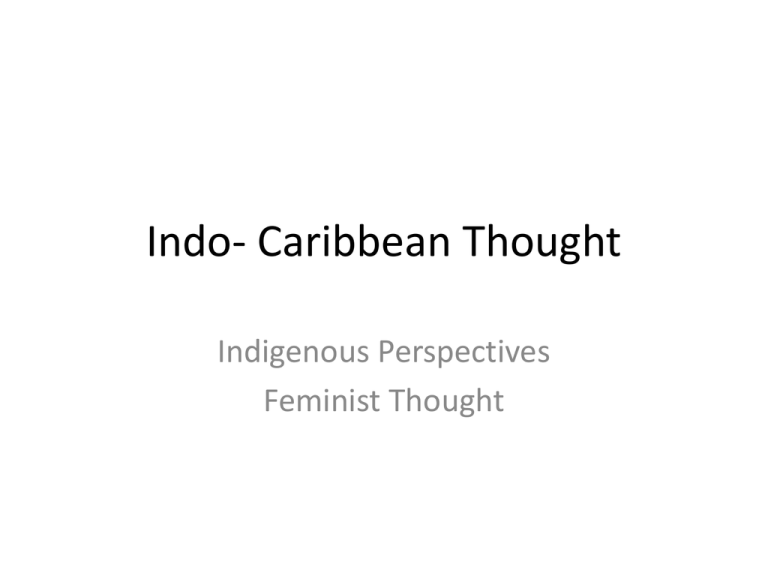
Indo- Caribbean Thought Indigenous Perspectives Feminist Thought • The Asians who came to the Caribbean as contract labour mainly from China and India in the 1800’s experienced the restrictions of colonialism and the hardships within their contractual arrangements. • Indo- Caribbean thought was largely a response to these conditions and an expressions of their culture within the Caribbean. • To date, Guyana, Trinidad and Suriname have the largest concentrations of Indians in the region. Guyana and Trinidad have two major ethnic groups (Indians and Africans); while Suriname has at least four ethnic groups (Hindustanis or East Indians, the creoles or Africans, the Javanese or Indonesians, and the Bush Negroes or Maroons) • Most whites who researched and analysed Indian communities in Guyana and Trinidad centred their studies against the background of colonialism, oppression and poverty (and how to reverse certain trends that emerged). • Themes in Indo- Caribbean thought focused on: 1. Identity- which covers religion and rituals e.g. marriage • Indians have retained their religions of Islam and Hinduism. Although they have accepted Western dress, religion still prescribes a code of conduct, rituals, food preparations etc. • Customs and religion also reinforces endogamy (choosing prospective wives or husbands for children from the clan) • However, the caste requirement of their culture had to be abandoned as Hindus and Muslims begin to intermarriage and the “mixed” population in Trinidad and Guyana begun to grow. 2. Citizenship- which covers such ideas as who is a genuine citizen (Africans or the Asians) and also who has more rights to the national “cake”. • None of the groups felt upon independence, that they were equal as citizens • The Africans felt that their long history of settlement and suffering gave them a prior claim as authentic citizens of the land. • Indians argue however, that they worked in building the agricultural sector and rescuing the colony in the aftermath of emancipation. • This situation grew as Africans believed they should have been awarded land upon emancipation as the Indians were. • This discourse led to increasing polarization between the two groups, who later both sought to form political parties and governments where one ethnicity dominated. (Lead to fraud claims: Forbes Burnham repeatedly returned to power even though Guyana has a majority Indian population) • Indo- caribbean writers include: V.S. Naipaul, Samuel Selvon and Ismith Khan (Indo- Trinidadian) Clem Seecharan and David Dabydean (Indo- Guyanese) Indigenous Perspectives • For many years Amerindian groups were portrayed by Europeans as childlike (Arawaks) and vicious cannibals (Caribs). • Writings with an indigenous slant have rejected these ideas. • Beginning in the first half of the 19th century West Indian scholars sought to reverse this perception. One critical objective of indigenous perspective was to correct the view that the natives did not have a history. Several writings or histories have sought to place indigenous groups on the historical map. • Examples: A history of the Guyanese Working People- Walter Rodney The Black Jacobins- C.L.R. James The Slaves Who Abolished Slavery- Richard Hart Black Rebellion in Barbados- Hilary Beckles • The Indigenous peoples of the Caribbean have also sought to change the myth started against them by the Europeans that they are extinct and that the small surviving populations are not “pure” Amerindians • Another objective of the writings was that Amerindian and African contributions must not be understood only in the capacity of labour, but for their cultural contribution. • Issues of concern to Indigenous peoples especially in Dominica, Guyana and Belize relate to: 1. Marginalization- social, economic and political E.g. Guyana is often said to be divided between the Indians (Indo- Guyanese) and the Africans (Afro- Guyanese), the Amerindians are usually forgotten. They are seen as a separate group located deep in the interior of the island and are referred to as just Amerindians. Amerindians in the region live in poverty and isolation 2. Land Rights- Indigenous groups have been engaged in protracted struggles with national governments to recognize and respect their ancestral claims to land • E.g. in Dominica Carib Chief has tried to oust non- carib men off their land and this became a politically sensitive issue. • In 1997, the Wai Wai and Makushi of Guyana were concerned that their lands were being infiltrated by mining and timber companies. However, their cries were ignored by the government. Feminist Thought • The intellectual tradition of feminism is based on the desire for equality between men and women in the workplace, politics, the family or in leadership positions. It is not about rule by women. • Feminist writers argue that in almost every area of social life, men are able to exert influence and control over others which result in an imbalance of power. • There are several strand of feminism: 1. Liberal feminism- they hold the view that men and women are equal and should both enjoy political, social and economic equality. They believe that legislation and education can bring about gender equality 2. Radical feminism- stress that the oppression of women by men is the root cause of inequality. Society is organized based on a male system of power that encourages sexism. 3. Marxist feminism- the view that by its nature, the system of capitalism oppresses women. The economic, political, religious and education systems are all dominated by the patriarchal system of beliefs. • The issues concerning women in the Caribbean were seriously brought to the fore in the 1960’s and 1970’s and came out of the feminist movement in the USA. • Throughout the Caribbean, women’s organisations have been created to promote the cause of women such as: The National Organization of Women (NOW) Sistren Caribbean Women’s Association (CARIWA) The volume of feminist writings has brought about some positive change in the attitudes of society towards women. There is now growing acceptance of women in managerial positions and politics. • • • • Some Caribbean Feminists include: Mary Seacole (Jamaica) Amy Ashwood Garvey (Garvey’s wife) Elma Francois (St. Vincent)

